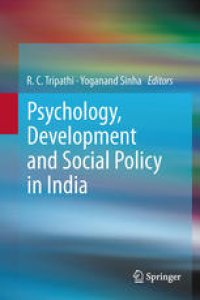
Ebook: Psychology, Development and Social Policy in India
- Tags: General Psychology, Social Policy, History of Psychology
- Year: 2014
- Publisher: Springer India
- Edition: 1
- Language: English
- pdf
This book examines how and where psychology can engage itself in the framing of social policies for national as well as human development in India. Although the role that psychological knowledge can play in informing social policy decisions has been discussed for a long time, psychologists by and large have had little role in framing policy decisions related to such important domains as education, health, social justice and social inclusion. Policy makers, not only in India, but more or less everywhere have focused on interventions at the macro level, which has led them to ignore the root causes of the problems lying at the micro level. However, with the more humanistic approaches now being followed by economists and other social scientists, the person in society is slowly taking centrestage. Micro-level variables like happiness, the wellbeing of individuals and the social relationships within which people define themselves are becoming important.
Therefore, this book discusses important psychological issues related to human development; particularly, health and education, social justice, social integration, environment and work organizations, besides focusing on some general issues relating to the logic of making social policies. It is a first-ever attempt in India to inform policy makers about how micro-variables can be a crucial factor to consider while framing social policies.
This book examines how and where psychology can engage itself in the framing of social policies for national as well as human development in India. Although the role that psychological knowledge can play in informing social policy decisions has been discussed for a long time, psychologists by and large have had little role in framing policy decisions related to such important domains as education, health, social justice and social inclusion. Policy makers, not only in India, but more or less everywhere have focused on interventions at the macro level, which has led them to ignore the root causes of the problems lying at the micro level. However, with the more humanistic approaches now being followed by economists and other social scientists, the person in society is slowly taking centrestage. Micro-level variables like happiness, the wellbeing of individuals and the social relationships within which people define themselves are becoming important.
Therefore, this book discusses important psychological issues related to human development; particularly, health and education, social justice, social integration, environment and work organizations, besides focusing on some general issues relating to the logic of making social policies. It is a first-ever attempt in India to inform policy makers about how micro-variables can be a crucial factor to consider while framing social policies.
This book examines how and where psychology can engage itself in the framing of social policies for national as well as human development in India. Although the role that psychological knowledge can play in informing social policy decisions has been discussed for a long time, psychologists by and large have had little role in framing policy decisions related to such important domains as education, health, social justice and social inclusion. Policy makers, not only in India, but more or less everywhere have focused on interventions at the macro level, which has led them to ignore the root causes of the problems lying at the micro level. However, with the more humanistic approaches now being followed by economists and other social scientists, the person in society is slowly taking centrestage. Micro-level variables like happiness, the wellbeing of individuals and the social relationships within which people define themselves are becoming important.
Therefore, this book discusses important psychological issues related to human development; particularly, health and education, social justice, social integration, environment and work organizations, besides focusing on some general issues relating to the logic of making social policies. It is a first-ever attempt in India to inform policy makers about how micro-variables can be a crucial factor to consider while framing social policies.
Content:
Front Matter....Pages i-xix
Introduction: Psychological Coordinates of Social Policy in India....Pages 1-29
Social Research and Public Policy: Some Cautionary Notes....Pages 31-39
Psychology and National Development....Pages 41-57
Human Development: Concept and Strategy....Pages 59-80
Education: Path to Development and Happiness in Rural India?....Pages 81-101
Language Policy and Education: Towards Multilingual Education....Pages 103-129
Learning Disability: Issues and Concerns with Implications for Social Policy....Pages 131-147
Social Policy and Mental Health: The Case of India....Pages 149-170
Psychology and Physical Disability Policies....Pages 171-192
Salience of Indigenous Healing Practices for Health Care Programmes in India ....Pages 193-209
Psychological Impact of Poverty and Sociocultural Disadvantage: Some Problems of Policy and Intervention Research....Pages 211-221
Research on Distributive Justice: Implications for Social Policy....Pages 223-255
The Hindu-Muslim Divide: Building Sustainable Bridges....Pages 257-284
Gender-Role Socialization, Stereotypes, Government Policies and Development....Pages 285-296
The Environment–Behaviour Link: Challenges for Policy Makers....Pages 297-320